 Petzlover
Petzlover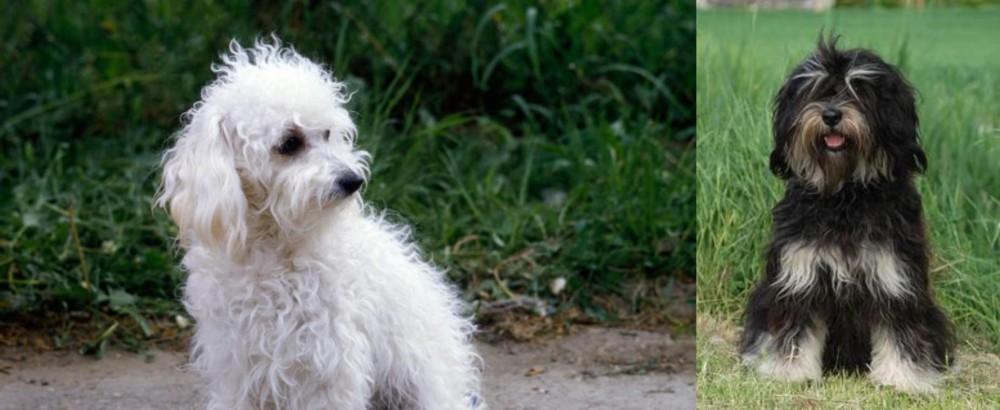 Bolognese is originated from Italy but Cao da Serra de Aires is originated from Portugal. Bolognese may grow 25 cm / 9 inches shorter than Cao da Serra de Aires. Bolognese may weigh 23 kg / 50 pounds lesser than Cao da Serra de Aires. Both Bolognese and Cao da Serra de Aires has same life span. Both Bolognese and Cao da Serra de Aires has almost same litter size. Both Bolognese and Cao da Serra de Aires requires Moderate Maintenance.
Bolognese is originated from Italy but Cao da Serra de Aires is originated from Portugal. Bolognese may grow 25 cm / 9 inches shorter than Cao da Serra de Aires. Bolognese may weigh 23 kg / 50 pounds lesser than Cao da Serra de Aires. Both Bolognese and Cao da Serra de Aires has same life span. Both Bolognese and Cao da Serra de Aires has almost same litter size. Both Bolognese and Cao da Serra de Aires requires Moderate Maintenance.
 The Bolognese has already been on record since the 13th century, being particularly popular among the aristocracy during the Renaissance. The breed hails from Italy. He belongs to a family of dogs that include the Maltese and Bichon Frise, all with similar temperaments and looks. Even though there are these similarities the Bolognese is a breed on its own – a distinctive breed.
The Bolognese has already been on record since the 13th century, being particularly popular among the aristocracy during the Renaissance. The breed hails from Italy. He belongs to a family of dogs that include the Maltese and Bichon Frise, all with similar temperaments and looks. Even though there are these similarities the Bolognese is a breed on its own – a distinctive breed.
The exact ancestry of the Bolognese isn’t altogether clear. The dog breed was brought to England in 1990 by Liz Stannard and it was in 2001 that the breed was shown at dog shows. He is classified as a toy companion breed.
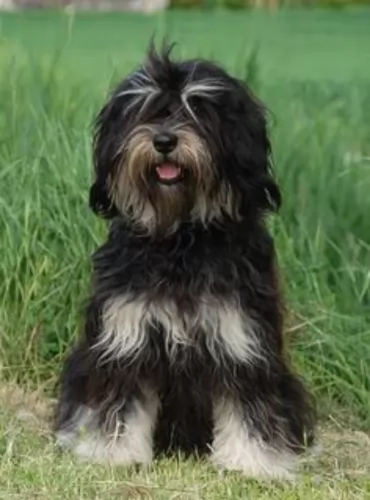 Ancestors of the Cao da Sera de Aires were used for herding livestock in the Serra de Aires and Alentejo, Portugal. This herding dog is native to Portugal and throughout the 20th Century he was kept as a working dog.
Ancestors of the Cao da Sera de Aires were used for herding livestock in the Serra de Aires and Alentejo, Portugal. This herding dog is native to Portugal and throughout the 20th Century he was kept as a working dog.
Known also as the Portuguese Sheepdog, Portuguese Shepherd Dog or Serra de Aires Mountain Dog, there are some questions surrounding the breed's ancestry as there are few records of dogs before 1900. The dog is thought to be related to the Pyrenean and Catalan Sheepdogs and that it has descended from Briards which were imported into Portugal and crossed with the Pyrenean Sheepdog.
The Cão da Serra de Aires breed standard was accepted by the Portuguese Kennel Club, and the breed was recognized internationally in 1996. The dog was also recognized by the United Kennel Club in the Herding Group in 2006.
 The long, flocked white coat doesn’t have an undercoat and the large, round, dark eyes peer out of a cloud of white hair. His hair sheds very little and some owners of the Bolognese like to keep the woolly hair texture trimmed. He has black nails and a largish black nose. He is a small dog, with the male standing between 27–30cm and the female being slightly smaller.
The long, flocked white coat doesn’t have an undercoat and the large, round, dark eyes peer out of a cloud of white hair. His hair sheds very little and some owners of the Bolognese like to keep the woolly hair texture trimmed. He has black nails and a largish black nose. He is a small dog, with the male standing between 27–30cm and the female being slightly smaller.
These little dogs weigh in at about 4kg. A toy breed, he is considered to be a true companion dog. He is compact and squarely built with his floppy ears set high on his head. The long tail is carried curved over the dog’s back.
He is a friendly, social dog and can very easily become a typical lap-dog because he just craves human companionship. He wants to be with you and close to your side, whether you live in the city or in the countryside – he adapts to life wherever you are.
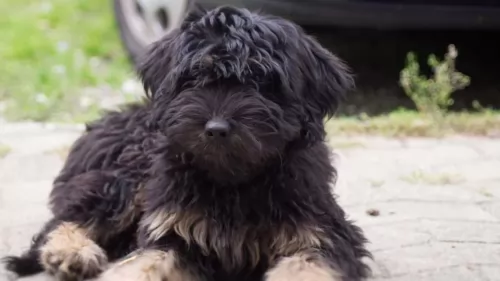 The beautiful Cão da Serra de Aires is a medium-sized dog. He stands at 45 to 55 cm at the withers and weighs about 17 to 27 kg. He is recognizable by the long, shaggy, single-layer coat, of straight or slightly wavy hair. Don’t be deceived by the coat as below, the dog has a muscular, athletic body.
The beautiful Cão da Serra de Aires is a medium-sized dog. He stands at 45 to 55 cm at the withers and weighs about 17 to 27 kg. He is recognizable by the long, shaggy, single-layer coat, of straight or slightly wavy hair. Don’t be deceived by the coat as below, the dog has a muscular, athletic body.
The coat comes in different shades such as fawn, gray, yellow and black. The dog has a long tail which is held straight out or down and he has medium-length, floppy ears. You’ve got to look hard, as the facial features of the dog are hidden by its shaggy coat. He has a lot of facial hair that sometimes you have to wonder if he can see out of his eyes.
The Cao da Serra de Aires is a wonderful canine companion and is devoted and loyal, forming strong bonds with their human family. He is a playful, amicable dog and gets on well with children in the home as well as with other pets.
He is intelligent and trainable, and when properly trained and socialized,he becomes an even nicer pet to have around and is obedient to his master’s voice. He is territorial, strong willed and dominant and makes a good watchdog too.
 The Bolognese is an easy-going, playful, intelligent little dog who will respond well to training and socialization. He can actually become calm and docile dog, although never dull as he can sometimes act like a clown and be quite entertaining. He makes a wonderful pet and becomes a loyal and devoted companion to adults and children.
The Bolognese is an easy-going, playful, intelligent little dog who will respond well to training and socialization. He can actually become calm and docile dog, although never dull as he can sometimes act like a clown and be quite entertaining. He makes a wonderful pet and becomes a loyal and devoted companion to adults and children.
Non-aggressive by nature, he will be friends with other pets in the home too. He is a small dog, so he isn’t going to be highly active and therefore won’t need loads of exercise, although he will love to go for a walk with you. He’ll also want to have games with the ball. He is such an amicable little dog and will easily adapt to life in the city or country, so long as he can be loved and cherished by his owners.
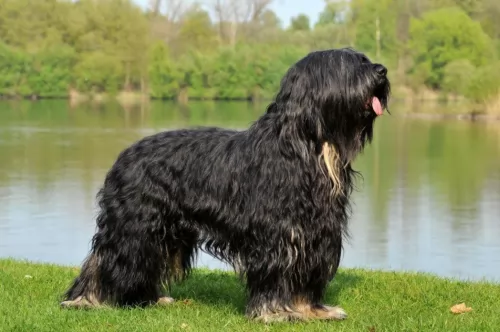 The Cão da Serra de Aires is such a loyal dog to his human family that he makes a splendid pet. He is active, having worked historically at herding and guarding.
The Cão da Serra de Aires is such a loyal dog to his human family that he makes a splendid pet. He is active, having worked historically at herding and guarding.
Socialization and obedience training ensure that he becomes an exceptional pet and he has a host of positive attributes to his name – he is intelligent, energetic, loyal and loving. He may have been used long ago to guard livestock, but today he is selected as a pet specifically for his excellent companionship and for his protective nature.
 Because this particular dog breed is uncommon, you won’t find many details on his health problems. When he is well looked after, he can reach 14 years of age. The Bolognese is from the Bichon Frise family so you can expect similar health problems, and also because he is a pedigree dog.
Because this particular dog breed is uncommon, you won’t find many details on his health problems. When he is well looked after, he can reach 14 years of age. The Bolognese is from the Bichon Frise family so you can expect similar health problems, and also because he is a pedigree dog.
Skin problems – battling with itchy skin conditions are a typical problem with the Bolognese.
Ear infections are common because of a lot of hair in the ear which can collect dirt.
Eye diseases - cataracts which can eventually lead to blindness.
Other health problems to watch for are heart disease, and epilepsy. Periodontitis is something you want to keep an eye on too because the small jaw is prone to developing periodontal infection which can lead to tooth loss.
Remember if you don’t want your Bolognese to be a parent, neutering and spaying provides major health benefits for your dogs.
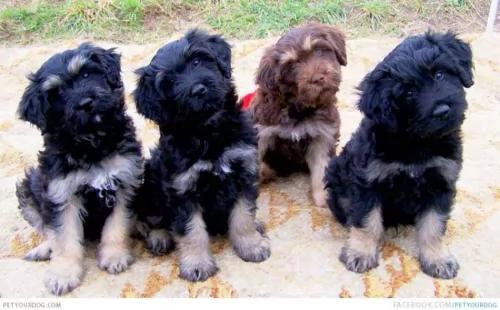 As with most dogs that are looked after well, their health can be good. The Cao da Serra de Aires isn’t likely to keep you at the vet often. Just like with any good dog, there are some health disorders that can benefit you to know about.
As with most dogs that are looked after well, their health can be good. The Cao da Serra de Aires isn’t likely to keep you at the vet often. Just like with any good dog, there are some health disorders that can benefit you to know about.
Being forewarned , you can get your pet to the vet quickly before the illness gets out of hand.
There are some pet owners who want to have their pets tested by the Orthopedic Foundation for Animals as well as the Canine Eye Registration Foundation to rule out health defects such as hip dysplasia and cataracts before they manifest themselves in their pets. This is of particular importance to breeders so as to prevent the parent dogs passing bad genetic conditions to the puppies.
This is a common skeletal disease where the dog’s hip joints don’t develop properly. It can be terribly painful for your pet to get around. It’s a genetic condition and while it is more prevalent in big dogs, any breeds are susceptible.
Your dog will battle along with painful joints and sometimes his hind-end will be lame. You’ll notice that once lying down, he battles to get up again. Fortunately vets are well acquainted with this ailment and they have different options to treat and manage it.
Cataracts in your dog come about from a disease process which affects the lens of the eye. The eye loses its transparency and impairs vision. There are some instances where cataracts can cause blindness. You’ll see a whitish gray area in your pets eye. The most common cause of cataracts is genetics. Get your pet to the vet who will do certain tests to evaluate the eyes and make a recommendation.
 The little Bolognese isn’t a big shedder so he isn’t a high maintenance pet. His long cloud of white hair can’t just be left though, because it will become tangled and dirty. Get the right grooming tools because his hair will require a good brushing every 2nd day or so. Professional grooming will also be required to keep his coat in tip-top condition.
The little Bolognese isn’t a big shedder so he isn’t a high maintenance pet. His long cloud of white hair can’t just be left though, because it will become tangled and dirty. Get the right grooming tools because his hair will require a good brushing every 2nd day or so. Professional grooming will also be required to keep his coat in tip-top condition.
You may want to use commercially manufactured dog food from leading brands recommended by your vet for small breed dogs. There is absolutely nothing wrong with that, but just like you want some variety in your diet, so does your pet.
Rice, meat and vegetables can be added into his food now and then as well as ensuring he has some raw meat in his diet. This is important if you want to ensure the health of your dog. Never leave your pet without a constant supply of fresh, cool water.
You can actually buy pet ear cleaners but you have to very careful not to go too deep into your pet’s ears as this can cause damage.
Brush your dog’s teeth a couple of times a week. Never use human toothpaste. You can buy special dog’s toothpaste and toothbrush.
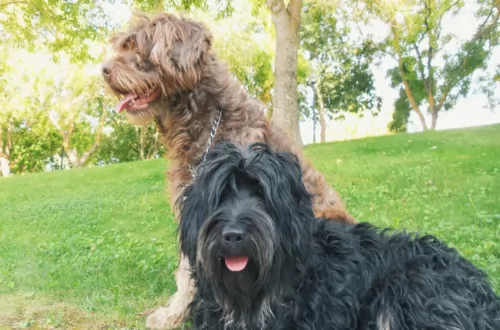 As a working dog used to long hours of action, the Cao da Serra de Aires will need lots of activity. He’ll need you taking him for long walks and playing ball games with him. He can become frustrated and destructive when left without any physical stimulation.
As a working dog used to long hours of action, the Cao da Serra de Aires will need lots of activity. He’ll need you taking him for long walks and playing ball games with him. He can become frustrated and destructive when left without any physical stimulation.
The Cao da Serra de Aires may have long hair but he isn’t high maintenance. He won’t require professional grooming, but will require a good brush a least twice a week. This is because the long coat can tangle.
To keep him looking his best, you’ll want to be trimming the hair around his paws. Another important grooming task is checking his ears and cleaning them. You have to be careful about cleaning your pet ears if you don’t know how, as it could damage the ears. Your vet can always advise you on how this is done.